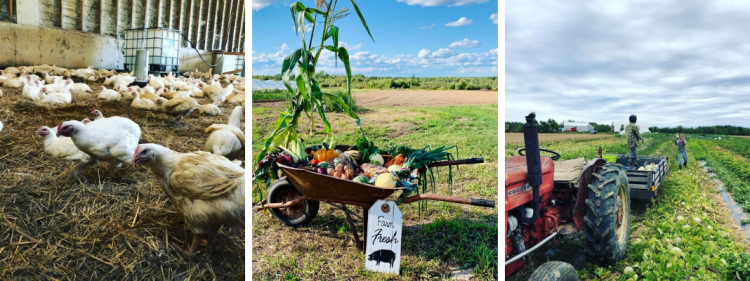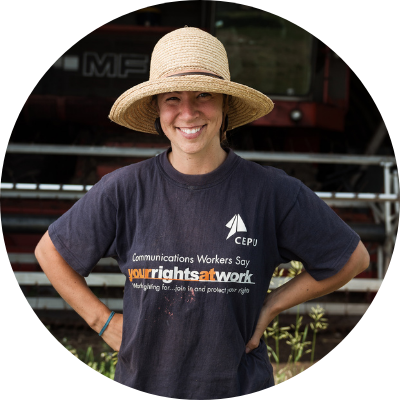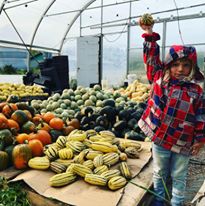Dispatch from the Food Movement: Rébeka Frazer-Chiasson, Ferme Terre Partagée, NB

On September 24, we met for a virtual visit with Rébeka Frazer-Chiasson of the Coopérative Ferme Terre Partagée in Rogersville, New Brunswick, an organic farm based on the values of agroecology and food sovereignty. The farmer, activist, and mother of two shared her journey, the barriers to working in agriculture and the changes she hopes to see at the political level.
“At the Cooperative Ferme Terre Partagée, we have a feeling of solidarity with peasants across the world and a sense of obligation to try to make the world a little bit fairer by improving access to food.”
What are the biggest challenges facing youth in agriculture in New Brunswick?
“The cost of land is still unaffordable even if [New Brunswick] is one of the most affordable places in Canada.”
“We are very late in talking about agriculture in our schools with young people, so that they might consider agriculture to be a possibility for themselves.” New Brunswick does not have a post-secondary program of training in agriculture, so young people have to leave the province to be educated in this sector.
What is the biggest change you would like to see on a political level?
Rébeka talked about the idea of supplying institutional programs with locally produced food. Rébeka mentioned that the new Strategy for the Purchase of Quebec Food in Institutions proposed by Équiterre is encouraging, but that in New Brunswick, there is “a long road ahead” to get there. The government has often tried to advance the issue by giving the responsibility to external organizations, all of which have ended up leaving or closing their doors due to a lack of financial support.
She is frustrated by how the government has been putting forward strategies as opposed to legislation to implement targets and objectives. Rebeka says that if the local food procurement is legislated, the government would realize that the few existing farms in the province would not be able to meet the demand. Instead, greater support is needed for farmers in order to supply food for institutions such as schools and hospitals, but also the wider New Brunswick population.
In an ideal world, what would you like to see in five years?
“Young people who are able to envision a career in agriculture as a possibility,” said Rébeka,
“It would be great if we could go into schools to speak about what we’re doing, and not only what we’re doing, but why we do it.”
When you ask farmers why they got into this career, often you’ll find that it’s because they had a real desire to feed their community. Unfortunately, our agricultural system operates in a way that makes sustainable, local food more expensive than food from larger, more industrial farms.
On this subject, Rébeka shared:
“We see in our basket program or with people at the market, yes they have a certain amount of privilege. We see that people make a lot of sacrifices to access this food, [but] we’re not interested in producing for just one segment of society.”
She explained that agriculture is not only about a question of production, it’s also about who we produce these products for, and how and where they will be distributed. “It’s all part of the same equation,” she continued.
As we enter into economic recovery, we should have the courage to imagine what our food systems can be: local and ecological, supply chains that are short and diverse, revitalizing communities and ensuring better access to healthy, fresh food, supporting low-emission food systems, building resilience against shocks and reducing food loss and waste.
______________
This interview was conducted as part of Food Secure Canada's work looking at how Canada can meet the Sustainable Development Goals (SDGs). To learn more about the SDGs, please see our page here.

